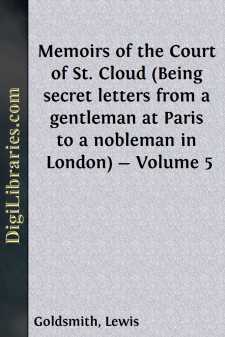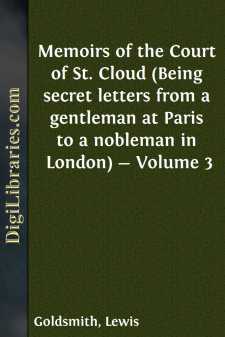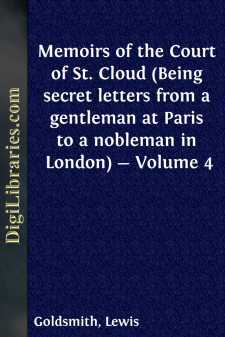Categories
- Antiques & Collectibles 13
- Architecture 36
- Art 48
- Bibles 22
- Biography & Autobiography 813
- Body, Mind & Spirit 142
- Business & Economics 28
- Children's Books 15
- Children's Fiction 12
- Computers 4
- Cooking 94
- Crafts & Hobbies 4
- Drama 346
- Education 46
- Family & Relationships 57
- Fiction 11828
- Games 19
- Gardening 17
- Health & Fitness 34
- History 1377
- House & Home 1
- Humor 147
- Juvenile Fiction 1873
- Juvenile Nonfiction 202
- Language Arts & Disciplines 88
- Law 16
- Literary Collections 686
- Literary Criticism 179
- Mathematics 13
- Medical 41
- Music 40
- Nature 179
- Non-Classifiable 1768
- Performing Arts 7
- Periodicals 1453
- Philosophy 64
- Photography 2
- Poetry 896
- Political Science 203
- Psychology 42
- Reference 154
- Religion 513
- Science 126
- Self-Help 84
- Social Science 81
- Sports & Recreation 34
- Study Aids 3
- Technology & Engineering 59
- Transportation 23
- Travel 463
- True Crime 29
Memoirs of the Court of St. Cloud (Being secret letters from a gentleman at Paris to a nobleman in London) - Volume 5
by: Lewis Goldsmith
Description:
Excerpt
LETTER I.
PARIS, September, 1805.
MY LORD:—Since my return here, I have never neglected to present myself before our Sovereign, on his days of grand reviews and grand diplomatic audiences. I never saw him more condescending, more agreeable, or, at least, less offensive, than on the day of his last levee, before he set out to be inaugurated a King of Italy; nor worse tempered, more petulant, agitated, abrupt, and rude than at his first grand audience after his arrival from Milan, when this ceremony had been performed. I am not the only one who has made this remark; he did not disguise either his good or ill-humour; and it was only requisite to have eyes and ears to see and be disgusted at the difference of behaviour.
I have heard a female friend of Madame Bonaparte explain, in part, the cause of this alteration. Just before he set out for Italy, the agreeable news of the success of the first Rochefort squadron in the West Indies, and the escape of our Toulon fleet from the vigilance of your Lord Nelson, highly elevated his spirits, as it was the first naval enterprise of any consequence since his reign. I am certain that one grand naval victory would flatter his vanity and ambition more than all the glory of one of his most brilliant Continental campaigns. He had also, at that time, great expectations that another negotiation with Russia would keep the Continent submissive under his dictature, until he should find an opportunity of crushing your power. You may be sure that he had no small hopes of striking a blow in your country, after the junction of our fleet with the Spanish, not by any engagement between our Brest fleet and your Channel fleet, but under a supposition that you would detach squadrons to the East and West Indies in search of the combined fleet, which, by an unexpected return, according to orders, would have then left us masters of the Channel, and, if joined with the Batavian fleet, perhaps even of the North Sea. By the incomprehensible activity of Lord Nelson, and by the defeat (or as we call it here, the negative victory) of Villeneuve and Gravina, all this first prospect had vanished. Our vengeance against a nation of shopkeepers we were not only under the necessity of postponing, but, from the unpolite threats and treaties of the Cabinet of St. Petersburg with those of Vienna and St. James, we were on the eve of a Continental war, and our gunboats, instead of being useful in carrying an army to the destruction of the tyrants of the seas, were burdensome, as an army was necessary to guard them, and to prevent these tyrants from capturing or destroying them. Such changes, in so short a period of time as three months, might irritate a temper less patient than that of Napoleon the First.
At his grand audience here, even after the army, of England had moved towards Germany, when the die was cast, and his mind should, therefore, have been made up, he was almost insupportable. The low bows, and the still humbler expressions of the Prussian Ambassador, the Marquis da Lucchesini, were hardly noticed; and the Saxon Ambassador, Count von Buneau, was addressed in a language that no well-bred master ever uses in speaking to a menial servant....









